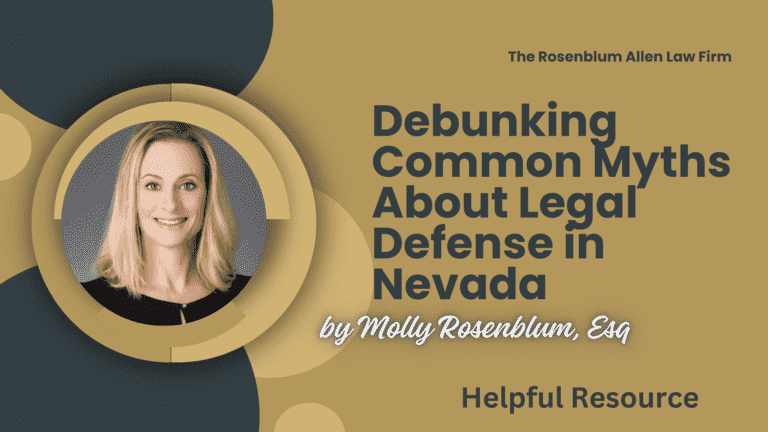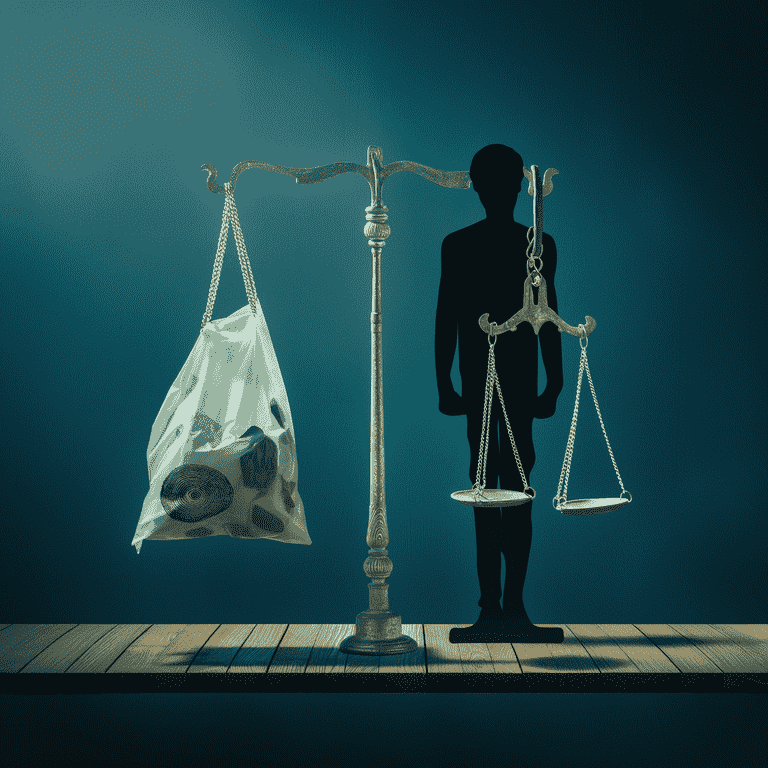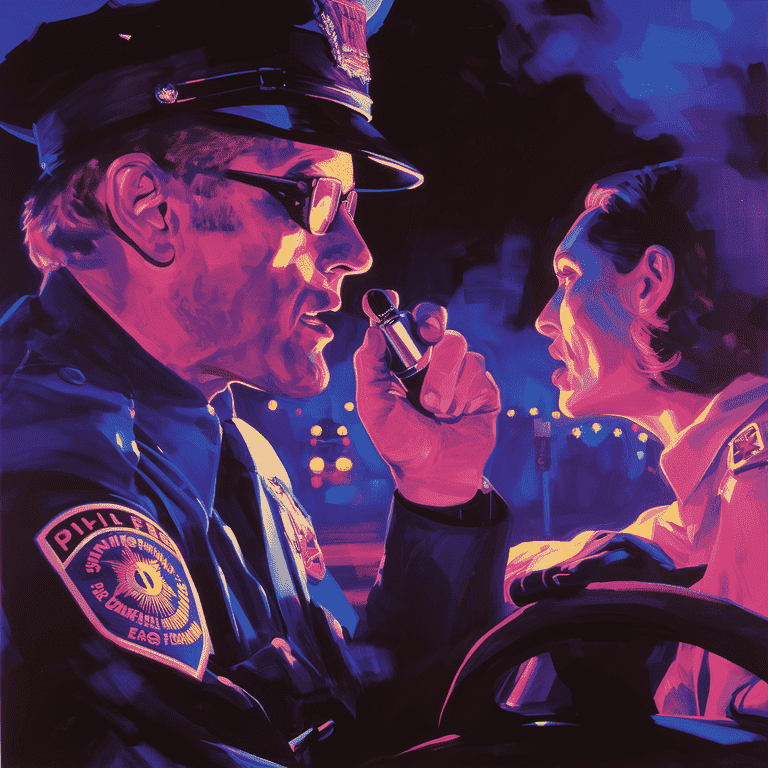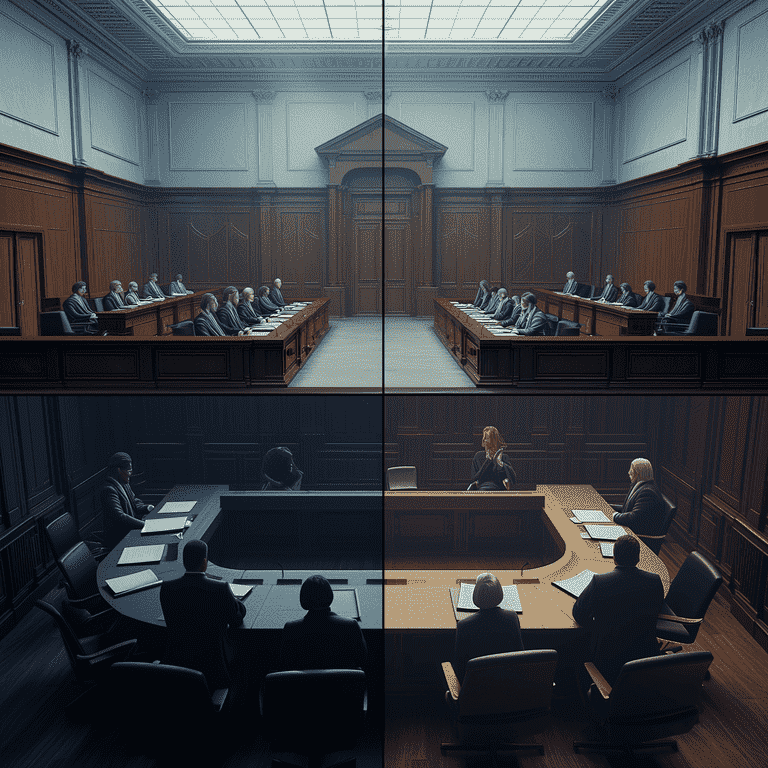Welcome to a comprehensive guide that dispels some of Nevada’s most persistent legal defense myths.
When it comes to legal matters, misinformation can have serious consequences.
Our goal here is to provide clear, accurate, and helpful information. We want to help you navigate Nevada’s often complex legal landscape.
Whether you’re facing legal challenges or simply curious, this guide will illuminate common misunderstandings about legal defense in the Silver State.

Myth 1: Public Defenders Are Always Less Effective Than Private Attorneys
Exploring the Role of Public Defenders
Public defenders are often portrayed as overworked. They are also portrayed as less competent compared to private attorneys. But, this portrayal overlooks the dedication and expertise of many public defenders. They bring these qualities to their profession. In Nevada, public defenders are licensed attorneys. They have the same legal qualifications as private lawyers. They are committed to providing the best defense possible to their clients.
Comparing Public Defenders and Private Attorneys
It’s important to understand that the effectiveness of an attorney, whether public or private, depends on various factors. These factors include experience, specialization, and resources. Private attorneys may have more time and resources to dedicate to a case, but that does not inherently make them more effective. Public defenders often have extensive experience in various topics. This experience can be a significant advantage in court.
Real-World Performance: Case Studies and Statistics
Studies have shown that the outcomes for clients of public defenders are not significantly different from those of private attorneys. In fact, in some cases, public defenders achieve better results due to their familiarity with local courts and procedures. Judging an attorney based on their merits rather than generalized assumptions is essential.

Myth 2: You Can’t Be Convicted Without Concrete Evidence
Understanding Legal Standards for Evidence
A common misconception is that convictions in Nevada require concrete or physical evidence. However, legal standards for evidence are more nuanced. The law permits various types of evidence, including circumstantial evidence. This type of evidence can be powerful enough to lead to a conviction.
Role of Circumstantial Evidence in Nevada Courts
Circumstantial evidence, such as witness testimony or behavior patterns, is critical in many cases. While it may not be as direct as physical evidence, it can effectively establish a defendant’s guilt. Nevada courts assess the credibility and relevance of all evidence, not just physical evidence, in determining a case’s outcome.
High-Profile Cases and Misconceptions
Several high-profile cases in Nevada have been decided on the strength of circumstantial evidence. These cases highlight the importance of understanding how the legal system weighs and interprets different types of evidence.
This guide aims to provide you with a clear and accurate understanding of legal defense in Nevada. We hope to empower you with knowledge and confidence by debunking these common myths.
Whether you’re involved in legal proceedings or simply seeking to be better informed. Stay tuned for further sections where we’ll continue to explore and dispel more myths about legal defense in Nevada.

Myth 3: Refusing a Breathalyzer Test Has No Legal Consequences
Nevada Laws on DUI and Breathalyzer Tests
In Nevada, many drivers mistakenly believe that refusing a breathalyzer test when suspected of driving under the influence (DUI) has no serious consequences.
However, Nevada operates under ‘implied consent’ laws. This means that, by driving on Nevada roads, you’ve implicitly agreed to submit to breathalyzer tests.
Refusing these tests can lead to immediate legal ramifications. This includes automatically suspending your driver’s license.
Legal Implications of Refusing a Test
Refusing a breathalyzer test can complicate your situation. The legal system may interpret this refusal as an admission of guilt.
This may potentially lead to harsher penalties. Moreover, even without breathalyzer results, you can still be prosecuted for DUI. This can happen based on other evidence, like officer observations or field sobriety test results.
Navigating DUI Charges: Strategies and Advice
If you’re facing DUI charges in Nevada, it’s crucial to understand your rights and options.
Cooperating with law enforcement officials doesn’t mean giving up your rights. Seeking legal counsel can help navigate these tricky waters. It ensures that you’re informed with every decision.
Myth 4: Only Guilty People Need a Defense Attorney
The Right to Legal Representation Explained
The notion that only guilty individuals require legal defense is a dangerous myth. In the United States, particularly in Nevada, the justice system is founded on the principle of ‘innocent until proven guilty.”
This means everyone has the right to legal representation, regardless of guilt or innocence. This right is a cornerstone of a fair and just legal system.
Innocent Until Proven Guilty: The Fundamental Principle
Innocent people can be embroiled in legal issues for various reasons, such as being in the wrong place at the wrong time or falsely accused.
A defense attorney provides more than just legal representation in court; they offer guidance through the complexities of the legal system, protect your rights, and help ensure a fair trial.
Case Studies: Wrongful Accusations and Legal Defense
History is full of instances of innocent individuals being exonerated. This often happened after years of legal battles. These cases underscore the importance of legal defense in ensuring justice. Innocent individuals are at a significant disadvantage in proving their innocence without proper legal representation.
Understanding these myths and the truths behind them is crucial for anyone navigating Nevada’s legal landscape. Remember, knowledge is your first line of defense in the legal system. Stay informed. Stay prepared.
If in doubt, seek professional legal advice. In the following sections, we’ll continue to debunk more myths about legal defense in Nevada. We’ll provide insights and information to guide you through any legal challenges you might face.

Myth 5: Legal Defense in Nevada is Too Expensive for the Average Person
Understanding Legal Fees and Payment Options
The belief that legal defense in Nevada is prohibitively expensive is a common misconception. It’s true that legal services can be costly. However, many attorneys offer flexible payment plans to accommodate different budgets.
Furthermore, not having proper legal representation can cost more than hiring an attorney. This is especially true if it leads to undesired legal outcomes.
Access to Legal Aid and Pro Bono Services
Nevada offers various legal aid and pro bono services for those who cannot afford legal representation.
Organizations like the Legal Aid Center of Southern Nevada provide free or low-cost legal services to those who qualify. These services ensure everyone has access to justice, regardless of their financial situation.
Cost-Benefit Analysis of Legal Defense
When considering legal defense, it’s essential to perform a cost-benefit analysis. Investing in incompetent legal representation can save you from more severe financial consequences.
These might include fines, bail, or even loss of income due to incarceration. An experienced attorney can often negotiate better terms or even get charges dropped, which is invaluable.

Myth 6: All Criminal Cases Go to Trial
The Process of Plea Bargaining
A common myth is that all criminal cases in Nevada end up in a courtroom trial. In reality, a significant number of cases are resolved through plea bargaining. Plea bargaining involves negotiating with the prosecution.
The goal is to agree on a lesser charge or reduced sentence in exchange for a guilty plea. This often streamlines the legal process and provides a more predictable outcome.
Statistics on Trials vs. Plea Deals in Nevada
Statistical data shows that most criminal cases are settled out of court. This trend is not unique to Nevada; it’s a common practice across the United States.
The reasons for this include the efficiency of resolving cases without a lengthy trial. Also, the opportunity for defendants to receive lighter sentences.
Making Informed Decisions About Your Case
Understanding the likelihood and implications of plea bargaining is crucial. It’s important to discuss all available options with your attorney, who can guide the best course of action based on the specifics of your case.
An informed decision is always better than one made out of fear or misunderstanding.
As we continue to debunk these myths, it becomes clear that the legal system in Nevada, like anywhere else, is complex and often misunderstood.
By clarifying these misconceptions, we aim to empower you with the knowledge. This will help you navigate legal challenges confidently. Knowledge, as they say, is power – and in legal defense, it’s your strongest ally.
Stay tuned for the conclusion of our guide. We’ll wrap up our discussion and provide extra resources for those seeking more information.
Why You Have Not Hired a Felony Defense Attorney Yet
Watch this short video to take the next big step toward defending your rights against a felony charge.

Breaking It All Down for You
As we wrap up our journey through the landscape of legal defense in Nevada, it’s crucial to reflect on why debunking these myths matters. Misinformation can lead to fear, poor decisions, and injustice. Arm yourself with accurate information and a clear understanding of your rights and the legal process. Remember, knowledge is not just about power but protection, clarity, and peace of mind.

Frequently Asked Questions
Can I represent myself in a Nevada court?
You can represent yourself in a Nevada court, a practice known as ‘pro se’ legal representation. However, it’s essential to be aware of the complexities and challenges of the legal system. Legal professionals recommend seeking legal counsel, even if you decide to represent yourself.
How does a plea bargain work in Nevada?
In a plea bargain, the defendant agrees to plead guilty to a lesser charge or one of multiple charges in exchange for a more lenient sentence or other concessions. The court must approve this negotiation between the defense attorney and the prosecutor.
What is the difference between a misdemeanor and a felony in Nevada?
Misdemeanors in Nevada are less serious crimes punishable by up to 6 months in jail and up to a $1,000 fine. Felonies are more severe crimes with stiffer penalties, including prison time, considerable fines, and significant long-term consequences.
How long does the legal process usually take in Nevada?
The duration of the legal process in Nevada varies greatly depending on the complexity of the case, the court’s schedule, and whether the case is settled or goes to trial. Some cases may be resolved in a few months, while others could take years.
What should I do if I can’t afford bail in Nevada?
If you can’t afford bail in Nevada, consider a bail bond, where a bail bond agency pays the bail on your behalf for a fee. Alternatively, your attorney can request a bail reduction. They can also argue for your release on your own recognizance during a bail hearing.
Is it possible to have a criminal record sealed in Nevada?
Yes, Nevada law allows for sealing certain criminal records. This can help with employment, housing, and other aspects of life. Eligibility to have a record sealed depends on the nature of the crime. It also depends on the time passed since the case closed.
Can a non-U.S. citizen face different legal challenges in Nevada courts?
Non-U.S. citizens may face more legal challenges in Nevada courts. This is especially true for immigration status. Certain convictions can impact immigration status, leading to deportation or ineligibility for naturalization. Non-U.S. citizens must seek legal counsel aware of these implications.
What are the rights of victims in Nevada criminal cases?
In Nevada, victims in criminal cases have several rights. These include being treated with fairness and respect. Also, being informed about the case’s status and attending public hearings. Finally, making victim impact statements at sentencing.

Glossary
Pro Se: Legal representation of oneself in court without the assistance of an attorney.
Plea Bargain: A negotiation in which a defendant agrees to plead guilty to a lesser charge or one of multiple charges in exchange for a more lenient sentence or other concessions.
Misdemeanor: A criminal offense less severe than a felony and generally punishable by fines, penalties, or a jail sentence of less than one year.
Felony: A serious crime, typically involving violence, and punishable by imprisonment for more than one year or death.
Bail: A set amount of money that acts as insurance between the court and the person in jail (the defendant). Paying bail allows the defendant to be released from jail while awaiting trial.
Bail Bond: An agreement by a criminal defendant to appear for trial or pay a sum of money set by the court. The bail bond is cosigned by a bail bondsman, who charges the defendant a fee in return for guaranteeing the payment.
Record Sealing: The practice of officially and legally concealing or erasing criminal records from state or federal databases, typically after the offender has met specific criteria.
Victim Impact Statement: A statement made during the sentencing phase of a criminal trial by the victim of the crime or the victim’s family detailing the harm caused by the crime.
Implied Consent Laws: Laws that imply that by driving on state roads, a driver consents to submit to a breathalyzer or similar tests under suspicion of driving under the influence (DUI).
Public Defender: A lawyer employed at public expense in a criminal trial to represent a defendant who cannot afford legal assistance.
Legal Aid: Professional legal assistance provided, typically free of charge, to people who cannot afford a lawyer.
Pro Bono Services: Legal services performed without charge or at reduced fees for the public good.
Circumstantial Evidence: Evidence that relies on an inference to connect it to a conclusion of fact, such as a fingerprint at a crime scene.
Innocent Until Proven Guilty: A legal principle that every person accused of any crime is considered innocent until proven guilty in a court of law.
Cost-Benefit Analysis: Comparing the costs and benefits of a decision, policy, or action.
Implied Consent: An individual’s implicit agreement to abide by specific rules or laws by engaging in certain behaviors or activities, such as driving.
Additional Resources for You

Our lead attorney, Molly Rosenblum Allen, Esq, has not only been at the forefront of legal representation but has also created a suite of valuable resources aimed at assisting you during challenging times. We’d like to remind our readers of these comprehensive guides, which offer in-depth insights into various legal topics:
Double Jeopardy: An essential read that clarifies the complexities of being tried for the same crime twice, featuring 52 comments and 30,000 views, with a 0.15 interaction rate.
Hung Jury: A detailed guide addressing the implications of a jury that cannot agree on a verdict, evidenced by 12 comments and 13,000 views, with a 0.05 interaction rate.
Circumstantial Evidence: A vital resource that sheds light on the role and nuances of indirect evidence in legal proceedings, with 28 comments and 13,000 views.
Indicted vs Charged: A must-read that distinguishes between these two crucial phases of the legal process, drawing 6 comments and 8,000 views, with a 0.15 interaction rate.
Difference Between Jail and Prison: An informative comparison that helps readers understand the distinct roles and conditions of jails and prisons, attracting 12 comments and 7,000 views, with a significant 1.8 interaction rate.
What are Miranda Rights: A fundamental guide explaining the critical rights of detainees during arrest and interrogation, evidenced by 65 comments and 3,600 views, with a 0.35 interaction rate.
How to Check if You Have an Outstanding Warrant: A practical guide for those concerned about possible outstanding warrants, ensuring you stay informed and prepared.
What to Look for in a Criminal Defense Lawyer: An insightful article detailing the key qualities and credentials to consider when choosing legal representation, with 10 comments and 12 views.
Possible Ways to Reduce a Felony Charge: A strategic guide offering insights into the potential pathways to mitigate the severity of a felony charge.
Should You Accept a Plea Bargain: A critical read for anyone contemplating the advantages and drawbacks of accepting a plea deal in their case.
We encourage our readers to utilize these resources to gain a clearer understanding of their legal standing and options. The Rosenblum Law Firm is dedicated to providing you with the knowledge and support you need in your time of need.

Offsite Resources You May Find Helpful
Here are several offsite resources that offer valuable information related to legal defense and law:
American Bar Association: A primary resource offering a broad range of information on legal topics and resources for both legal professionals and the public. Visit American Bar Association
FindLaw: This site provides a wealth of legal information and resources, including articles and tools for understanding different legal issues and areas of law. Visit FindLaw
Nolo: Known for making law accessible to the general public, Nolo offers clear, useful information and resources on a wide range of legal topics. Visit Nolo
National Association of Criminal Defense Lawyers (NACDL): This organization offers support and resources for criminal defense lawyers and provides extensive information on criminal defense law. Visit NACDL
The Innocence Project: A non-profit legal organization dedicated to exonerating wrongly convicted individuals. The site offers insights into the legal system and its challenges. Visit The Innocence Project
Justia: A comprehensive resource offering free access to case law, legal codes, and extensive legal information for a variety of audiences. Visit Justia
Avvo: This site offers a directory of lawyers and legal advice, providing users with easy access to legal resources and professional assistance. Visit Avvo
Each of these resources provides valuable insights and information that can deepen your understanding of legal systems and defense strategies.

A Special Message From Our Lead Attorney
Why You Might Need a Lawyer

Molly Rosenblum, Esq
Dear Reader,
Thank you so much for taking the time to explore our resources. We hope you found the information insightful and empowering. At The Rosenblum Allen Law Firm, we understand that navigating legal challenges can be daunting. We’re here to offer support and guidance.
We invite you to schedule a free consultation. If you have any questions or need personalized legal advice, please reach out. You can reach us at (702) 433-2889. Our team, led by me, Molly Rosenblum, Esq., is dedicated to providing you with the legal expertise and support you need.
I am looking forward to assisting you.
Warm regards,
Molly Rosenblum, Esq.



